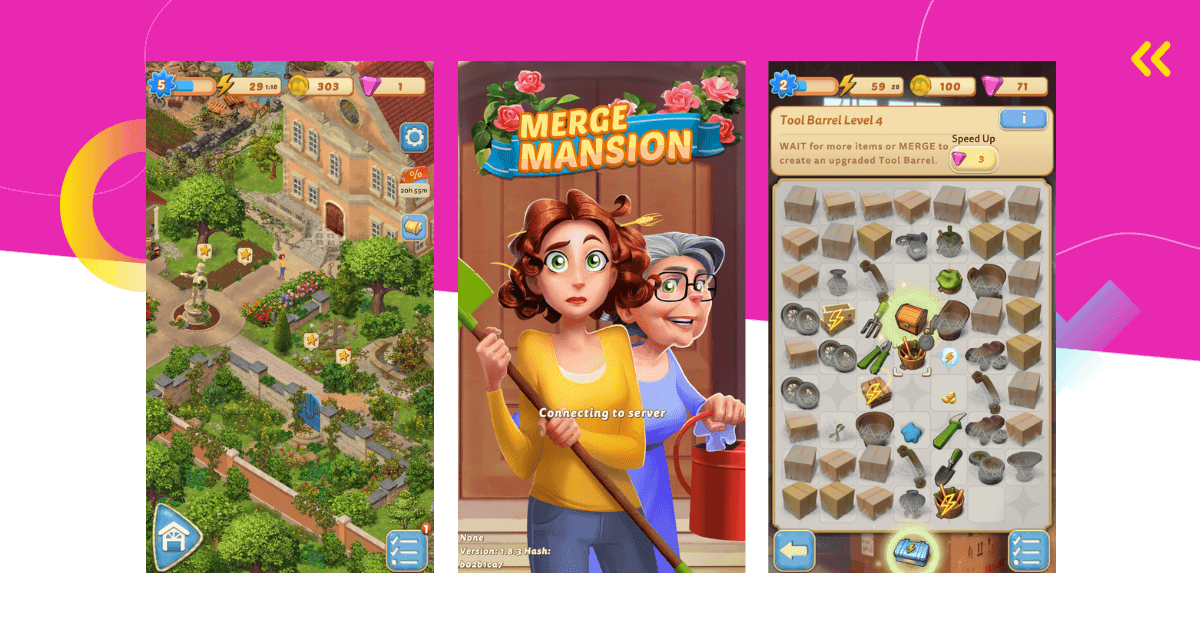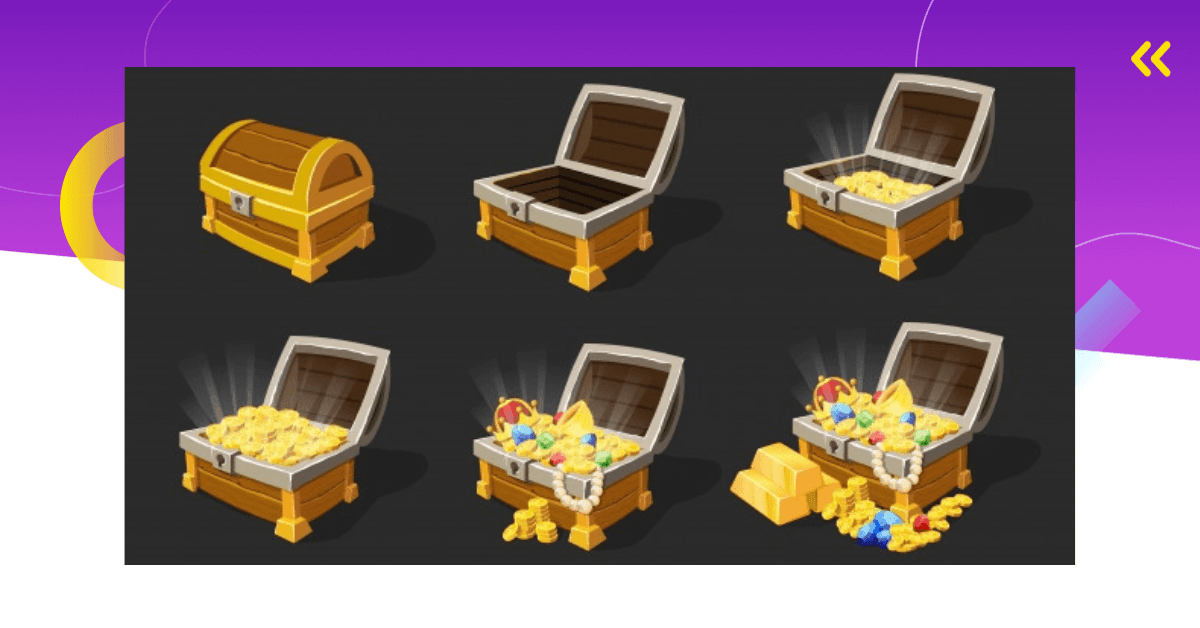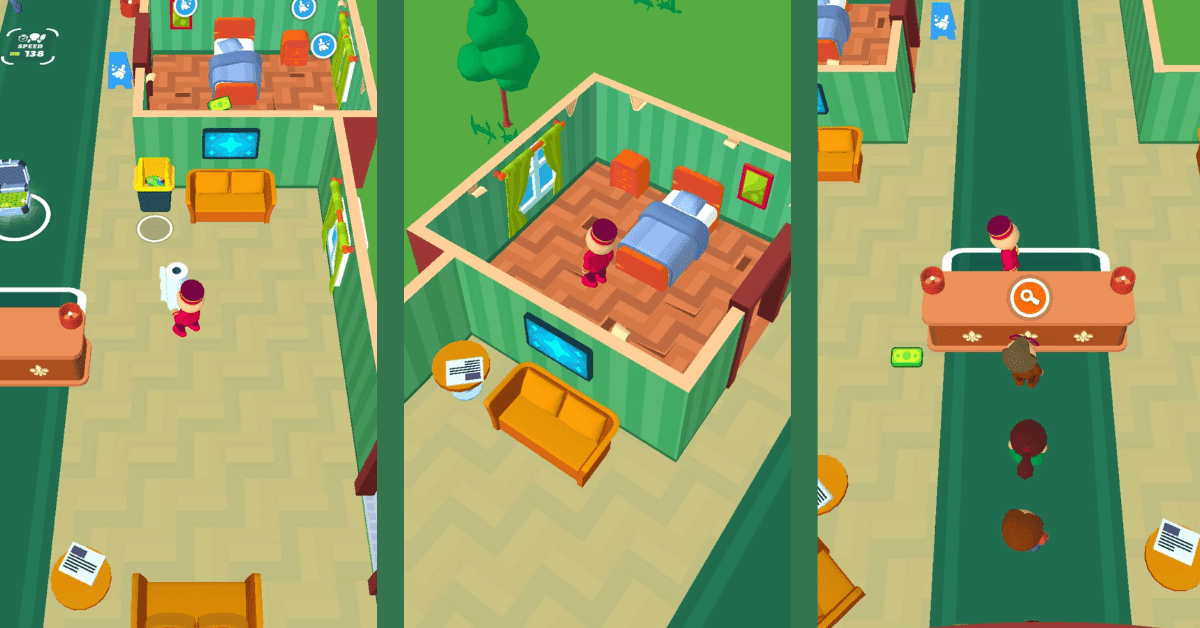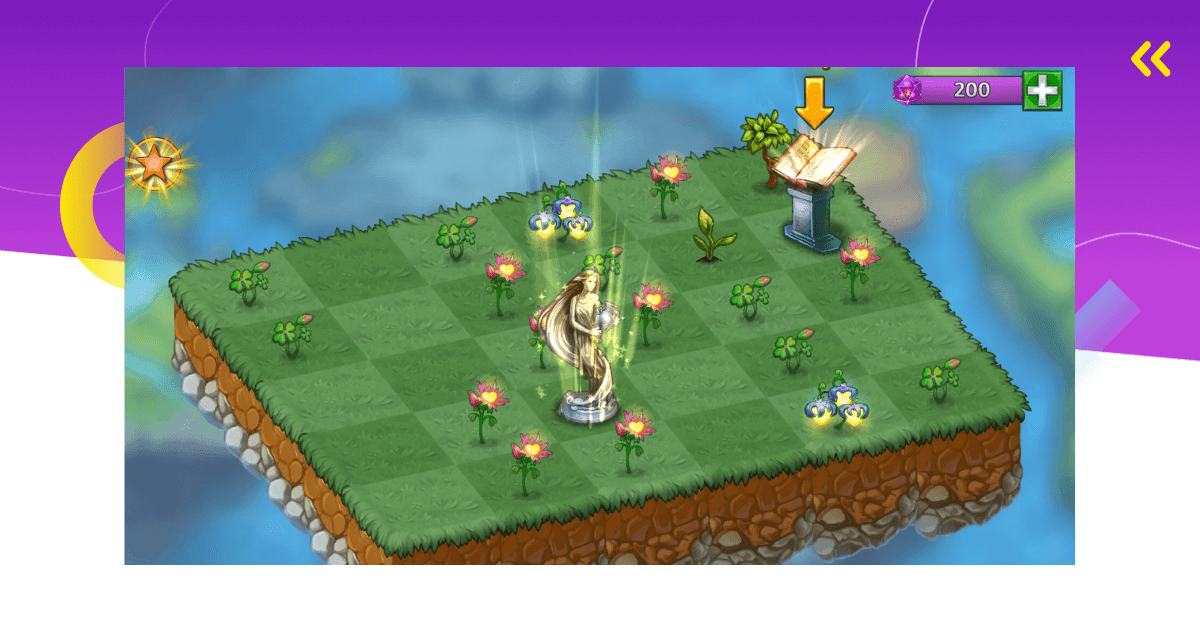I’m sure you’ve heard merge games are hot right now. The number of developed merge games is constantly growing, and so are their revenues.
One of these games is Merge Mansion.
In this article, I’m analyzing Merge Mansion monetization. I will guide you through all the strategies this game uses to monetize its players.
Let’s start.
About Merge Mansion
Merge Mansion appeared on the market back in September of 2020 and it quickly became a well-known name in the merge genre. It also became a huge competitor for the established merge games like Merge Dragons.
One of the reasons is Metacore’s relationship with Supercell. The Finnish mobile game giant recognized the game’s potential early on. Back in September of 2020, Metacore raised $17.7 million in equity and an $11.8 million line of credit from Supercell.
Why is that?
Supercell wanted a stake in this game’s success, and they sure have the money to make it happen.
This partnership had a significant influence on the way in which Merge Mansion acquires users. Thanks to these resources, the game got in front of a huge base of potential users.
This is just one of the reasons why the game is making big bucks.
As you know, game monetization goes beyond all that. Acquiring users is one thing, but making them play the game and spend money on it is a different beast altogether.
There are a lot of factors at play here – from the first-time user experience to the game’s offerings and retention strategy. One is not less important than the other.
Merge Mansion Statistics for 2023
Let’s take a moment to go over some data. More specifically, Merge Mansion download and retention data – it will tell us more about how successful it is.
Data source: AppMagic, a leading mobile intelligence platform. Get 3 days of free access to all AppMagic’s features, as well as 10% off, by clicking this link.
So far, this merge game has been downloaded more than 33 million times. The downloads reached their peak back in May 2021 (almost 2 million). The second significant peak happened in April 2022.
After that, until the end of 2022, players were downloading Merge Mansion less than that. However, it’s worth noting the mobile gaming market overall is experiencing a drop in downloads.
While Merge Mansion downloads have been going up and down, its revenue has been on a steady incline since the game’s release and reached its peak in late 2022. Currently, the game earns more than $10 million per month from its players. So far, this game bagged more than $160 million.
Additionally, the game’s cumulative RpD (lifetime revenue divided by lifetime downloads) is $4.82.
Now, let’s figure out the strategy behind the Merge Mansion monetization strategy!

First-Time User Experience (FTUE)
Merge Mansion players are welcomed by a dialogue.
Of course, it is not just any kind of dialogue.
It is a conversation between the game’s protagonist and her grandma. In it, she finds out her grandparents have been hiding a secret mansion behind their house. To make things even more interesting, the city council wants to tear the place down.
Therefore, the players have an important task – saving the house.
This storyline works as the game’s hook. Having a captivating story in the FTUE can create immersion and make players addicted to the game.
All this captures the players’ attention and prepares them for the next step – learning to play the game.

Game Tutorial
The core of this game is merging, so this is the basic mechanic players have to learn.
Players are thrown to the game’s merge board, with the protagonist as their tutorial character. Hence, players get written instructions from the character. They also get a helping hand – a pointer that shows them what they need to do.
The tutorial is not an isolated experience.
This type of tutorial is called a contextual lesson. Players get some guidance, but they need to play along. While they do this, they are progressing through the game.
Using protagonists as tutorial characters is a positive practice. The thing is, this should create a positive attachment between the player and the character. Especially if the characters are likable like the one in this game.
Moreover, the tutorial doesn’t stop at the beginning. Whenever a new feature is added, the game educates players about it. The logic? The more invested players are, the more receptive they will be to in-game learning.

UX/UI
Many factors play a role in the players’ user experience.
In the puzzle genre, it’s incredibly important for the game to be intuitive, simple, and understandable. Merge Mansion does all this quite well.
One of the key factors here is the user interface.
Just like most puzzle games, the main feature on the screen is a recognizable play button. The button works as a seamless transition from the meta-layer to the merge board.
Another important element of the interface is the Tasks feature. This feature is a bit problematic.
In most top puzzle games, players can see their goals while they are playing. Here, they have to remember it. For example, I kept forgetting what my tasks were, so I constantly had to return to this section. And I’m positive that I’m not the only one.

How Does Merge Mansion Work?
Merge Mansion is a merge-2 game.
In it, players need to merge two items to create a brand new, upgraded item. These items include tools, furniture, plants, etc.
For example, two knives turn into pruning shears, while two lightbulbs make a post light. These are some of the things players need to renovate the mansion and progress through the narrative.
This is also one of the main things that make Merge Mansion different from its competitors. In most merge games, we can see a merge-3 model.
Another thing that makes this game special is single-level gameplay.
Unlike in most puzzle games, here, as players climb levels, they don’t switch boards. Instead, gameplay happens on a single board. Players need to work with what they have on the board to complete tasks.

Moreover, players can add new resources to the board. This is called spawning, and it spends the players’ energy.
And just like it always goes with energy, this limits the players’ sessions. For this reason, they need to use it strategically.
The players’ sessions are also limited with wait timers. They can spawn resources, but only to a certain point. When they reach it, they face wait times. The only way to skip them? Gems.
All of this gives players reasons to spend on the game.
Players also need to watch out for clutter.
Sure, spawning items is great and helpful, but it can also create a mess and take up a lot of space. To create some order, players can either merge or sell items.
Again, all of this requires a lot of strategic thinking. At the end of the day, that’s what most puzzle games are all about.

The Meta
Some say that Merge Mansion is very similar to Homescapes, its match-3 counterpart.
The reason?
Similar narrative/renovation meta layers.
The game’s developer, Metacore, puts a strong focus on the metagame. I mean, hello – the studio’s name is Metacore.
Here’s how the studio’s CEO, Mika Tammenkoski, explains its name, “We believe that both core mechanics and meta are important when it comes to game development. But we really prioritize ideas or strong meta structures for games.”
Here’s how the game’s meta structure works.
Every time players complete tasks on the merge board, they return to the renovation meta-layer. In it, they can see their efforts come to life. For example, they can see how an ax they’ve merged on the board tears down giant trees on the property.
In the renovation meta, players also unlock new areas of the mansion they need to renovate. All of this contributes to the feeling of progression.
This is quite an original approach.
The thing is, in this game, players can take advantage of core game resources.
In most other games, on the board, players only collect currency and then use it in the meta layer. Here, on the other hand, they use garden gloves, screws, shovels, and other items from the merge board.

The other meta layer is the above-mentioned narrative. The dialogues, of course, don’t stop at the beginning. Every now and then, new happenings shake up the story.
In most cases, they end up on some kind of cliffhanger. This leaves players thinking, “What’s going to happen next?”
All in all, both of the game’s meta layers work as the glue that holds the whole game together.
Merge Mansion Monetization Strategy Breakdown
When it comes to Merge Mansion monetization, the game sticks to best practices in the puzzle genre.
Just like the most lucrative games in the genre like Candy Crush Saga and Homescapes, it monetizes with in-app purchases.
Of course, it does it in its own way.
One of the key things that determine the game’s monetization strategy is the audience it attracts.
Facebook Gaming has identified eight common player motivations. Out of them, there are several we can commonly find among Merge Mansion players.
A lot of players play this game because they find it relaxing. The core gameplay is simple, and it allows players to get their minds off their issues and worries.
Closely related to relaxing, the game attracts players looking to escape the real world. This game allows them a short getaway in the game’s immersive experience.
Let’s not forget that this game is very skill-based. For this reason, it draws players looking to hone their skills and become merge experts.
Finally, it’s natural that when players play a game, they want to progress in it. Some players’ main focus is progress, and the feeling of accomplishment drives them through the game.
Whatever the reason players play the game is – there is a chance they will spend money on it. Especially if their motivation to play is strong enough.

Merge Mansion In-App Purchases Strategy and Setup
Whenever Merge Mansion players feel things are lacking, they can head to the game’s store.
The store works in two ways: as an in-game shop and a place to spend real money.
This is a great strategy to attract players to visit the game’s offerings. To make this even more probable, the game lures players to the store with free daily items. For example, a free piggy bank.
In the in-game shop part of the store, players can also purchase different in-game items by using currencies.
Speaking of currencies, there are two in this game – gems and coins.
Gems are the game’s hard currency. As such, they can be used for all sorts of purposes. For example, unlocking items, skipping wait times, buying energy, etc.
The list goes on.
When players first start playing, the game gives them a big stash of gems to get them started.
Later on, it becomes much less generous.
Since gems are so useful and rare, they are also the game’s best-selling item. According to Sensor Tower’s iOS data for the U.S., the smallest packs ($1.99 and $4.99) sell best.
Obviously, most of the game’s spenders aren’t ready to go all-in on a single purchase.
Proceeding with currencies, coins are the game’s soft currency. With it, players can buy items from the game’s shop. They can also be purchased with real money, but not a lot of players buy them.
The reason?
The game gives out big amounts of coins through gameplay. Hence, players don’t have such a strong desire to purchase them like they do with gems.
How In-App Purchases Really Work in Merge Mansion?
Sure, it’s helpful to know the game’s monetization setup.
However, the only way to truly understand how a game monetizes is by becoming a player.
For this reason, I played Merge Mansion for five days. I wanted to know how it feels to be a free-to-play player in this game.
Here’s what I learned about Merge Mansion monetization strategy.

Day One
On the first day, I had a short and enjoyable session.
What made it so enjoyable? A well-done FTUE.
All players begin the game with a big stash of coins and gems (100 of both). As they play, they discover all the ways in which they can spend them.
With these currencies, players can play without limitations. They can skip wait times, buy whatever they want, and progress quickly. In other words, they enjoy a premium gameplay experience.
All of this is a part of the game’s monetization strategy. The strategy? Spoil them, then monetize them.

Day Two
Early into my second session, a new icon appeared on my home screen. It came with a discount tag and a timer.
This was the game’s first IAP offer – a Starter Pack.
It came at a surprisingly high price for a starter pack offer – $4.99. This is higher than we usually see in puzzle games (e.g., $1.99 in Homescapes). Also, as I mentioned before, in this game, players usually go for low-priced offers. All of this makes this offer a pretty bold choice.
But hey, I guess it works for them.
Starter packs should be one of the game’s most valuable offerings. They are meant to become the players’ first purchase. For this reason, they need to bring great value for money.
This offer delivers on that. It is much more valuable than store offerings, which makes it more tempting.
There was one more problem to it, though.
When the offer appeared, I had only spent roughly half of the currency stash I had received from the game. Hence, I didn’t feel anything was lacking just yet.
Usually, games should introduce starter packs when players stumble upon their first obstacles. Therefore, according to the best practices, this offer appears earlier than it should.
However, it didn’t take long until I started lacking resources.
When I leveled up, I received a chest from the game. I wanted to open it, but it came with a wait timer. As I got used to premium gameplay, I didn’t want to wait for something for the first time in the game. But this time, I didn’t have enough gems to skip the wait time.
This was an important moment for Merge Mansion monetization strategy.
At this point, the game stops spoiling players. From this point on, the players start facing difficulties, such as restricted sessions and a lack of resources.

Day Three
The moment I launched the game, the Starter Pack appeared as a pop-up. This only happened at the start of the session, not during gameplay.
This is a good, moderately aggressive reminder about the offer.
During my third day of playing, the resource shortage became more frustrating.
Previously, I was able to progress even with all the obstacles. If I couldn’t complete one task, I would complete another one and progress anyway.
However, in this session, I wasn’t able to complete any of the tasks.
For example, I needed to create two flowers. But spawning seeds and merging can take quite a while. Somewhere in this process, a wait timer stopped my effort. At this point, I had nothing left to do in the game.
This kind of situation leaves players with two choices – making a purchase or exiting the game.
Naturally, it leaves a lot of players with a bittersweet feeling. While some will return to the game, some will churn for good.
As a non-payer, I exited the game, hoping something would change the next time I returned to it.

Day Four
On my fourth day of playing, I was welcomed by a pop-up IAP offer. However, it wasn’t the same one as before.
The new offer was named simply Limited Offer, and it cost $2.99. This is quite a generic name for an offer. Unlike the Starter Pack, its name doesn’t seem to be in line with the players’ in-game journey.
When it comes to value for money, this offer was less valuable than the Starter Pack.
Here’s the logic behind the offer.
The Starter Pack was more expensive but also more valuable. However, a lot of players didn’t even think about it because the price was off-putting.
Since this offer is cheaper, it should be more appealing for this group of players.
Another good thing about this offer is its timing. At this moment, players could really use assistance from the game.
For this reason, it’s good the offer doesn’t appear just as an icon on the home screen but as a pop-up. As an icon, the offer may remain hidden for potential buyers, but this way, all players are aware of it.

Day Five
When the timer for the previous IAP offer expired, a new pop-up appeared at the start of my session.
It brought not one, not two, but three offers to the table. Priced at $2.99, $9.99, and $13.99, the offers have given players more reasons to think about making a purchase.
Naturally, most players who will consider the offers will focus on the cheapest one. For this reason, with the other two offers, the game tells the players, “Hey, you can get better value for your money.”
Besides currencies, all of the offers include gift boxes or chests. All of these contain resources for the board.
This shows the game is up-to-date with the players’ progress. At this point in the game, players are craving resources. I know I did.
The offers were also named after these boxes/chests. For example, a “Brown Chest Pack”. These names make them appear less generic than the offer from the day before. With this kind of messaging, there is a better chance that players won’t ignore the offers.

User Retention in Merge Mansion
Monetization is not possible without player retention.
Every game’s goal is to keep players in the game for as long as possible. To achieve this, different games use different methods.
Here’s what Metacore’s CEO, Mika Tammenkoski, says about their approach to retention, “What really is of interest to us is to keep players playing the games for years to come. And that’s where the strong meta comes from.”
As you can see, meta layers are the key retention tool in this game. However, they are not the only ones.

Some other methods Merge Mansion uses to keep its players engaged include:
- An efficient onboarding process
- Push notifications
- Daily rewards
- Daily tasks
- Events
- Social media connection
While it’s great that the game has all of these retention techniques, there are some flaws to its retention strategy.
The main one? A lack of social features.
The only social feature in the game is social media connection. Yet, it is hidden in the game’s settings. Players don’t even get a pop-up inviting them to connect to social media, which is a practice we can see in most top games.

Merge Mansion Monetization: Key Insights
All in all, the Merge Mansion monetization strategy is well-done.
It relies on the most prominent strategy for this type of game – in-app purchases. However, players don’t feel obligated to make purchases.
The main pain points players have in this game are inventory limitations and the wait timers.
When this happens, they can make things easier for themselves with in-app purchases. If not, they will have a more frustrating experience, but they can still keep playing. The game doesn’t block the players’ progress, it just slows it down.
Moreover, the game’s monetization approach is not too aggressive. Pop-ups occasionally appear, but they are worth looking into. It is also noticeable that the pop-up offers track players’ progress.
Now, the not-so-good.
I can’t shake the impression that this game is missing out on potential revenue. In this case, I’m talking about revenue from non-paying players or from very engaged players. In other words, I believe the game could benefit from either rewarded video ads or a subscription offer.
These practices have already proven effective in many merge games.
For example, EverMerge uses both, while Merge Dragons has a subscription offer. With additional revenue streams, these games broaden the player base they can monetize.
Wrapping Up on Merge Mansion Monetization
Nowadays, the mobile game market is saturated with merge games. For this reason, creating a profitable merge game is a challenge.
Merge Mansion successfully deals with this challenge. Hence, if there is one thing I can say with certainty, it’s that Merge Mansion monetization works.
Can it work even better? This is a new game, so we have yet to see if the developer will try out some new strategies and whether they will work or not.







Comments